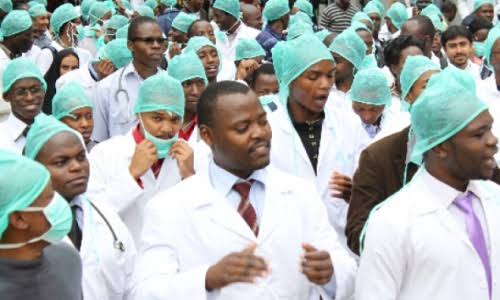Doctors recruited from some of the world’s poorest countries to work in hospitals in the United Kingdom have said they were being exploited and overworked by their employers.
According to a BBC investigation, doctors from Nigeria were being recruited by a British healthcare company and expected to work in private hospitals under conditions not allowed in the National Health Service.
The British Medical Association (BMA) has described the situation as “shocking” and said the sector needs to be brought in line with NHS working practices.
In an interview with several foreign medics, including a young Nigerian doctor who worked at the private Nuffield Health Leeds Hospital in 2021, Augustine Enekwechi, said his hours were extreme – on-call 24 hours a day for a week at a time – adding that he was unable to leave the hospital grounds.
He said working there felt like being in “a prison”.
Enekwechi stated that the tiredness was so intense, saying there were times he worried he couldn’t properly function.
“I knew that working tired puts the patients at risk and puts myself also at risk, as well for litigation. I felt powerless… helpless, you know, constant stress and thinking something could go wrong,” he said.
Nuffield Health disputed those working hours, saying its doctors were offered regular breaks, time off between shifts, and the ability to swap shifts if needed.
The company added that “the health and wellbeing of patients and hospital team members” was its priority.
The BMA and the front line lobbying group the Doctors’ Association gave the BBC’s File on 4 and exclusive access to the findings of a questionnaire put to 188 Resident Medical Officers.
READ ALSO: 34,000 Nigerian students bring 31,898 dependants to UK
Most of the doctors were employed by NES but some were with other employers.
It was discovered that 92% had been recruited from Africa and most – 81% – were from Nigeria. The majority complained about excessive working hours and unfair salary deductions.
For years now, the World Health Organization (WHO) has warned against the “active recruitment” of doctors and nurses from developing countries with severe shortages of medical personnel.
The WHO has compiled a list of 47 such countries – most of them in Africa. The UK government has incorporated that list into its own code of practice – calling it the “red list”.
In effect, it makes Nigeria a no-go destination for British medical recruiters.
In an examination in Lagos State, Nigeria’s capital hub, it was gathered that hundreds of doctors queued to take a Professional and Linguistic Assessments Board test – or PLAB 1.
The paper is set by the General Medical Council in London and is the first step required by the British medical authorities to secure a licence to work in the UK.
The doctors who spoke on the development said they were attracted by the potential of higher salaries and better working conditions.
The event was being overseen by staff from the British Council – an organisation sponsored by the Foreign Office. The GMC also offers the exams in several other red-list countries – Ghana, Sudan, Pakistan, and Bangladesh.
However, both the GMC and British Council denied they were involved in “active recruitment” saying they were only helping to provide a service for doctors wanting to come to the UK independently – something that is allowed under the guidelines.
Another doctor, who was sent to a different hospital to Augustine, Dr Femi Johnson, said he was also expected to work 14 to 16-hour days and then be on call overnight.
He said: “I was burnt out. I was tired, I needed sleep. It’s not humanly possible to do that every day for seven days.”
READ ALSO: Osinachi was verbally, physical abused by her husband – Witnesses
But when he needed a break because he was too exhausted to continue, NES were entitled to deduct money from his salary. The company said that was to cover the cost of finding a replacement doctor, but Femi said it left NES doctors in a terrible dilemma.
“In situations like that, I always make that internal discussion with my inner self – ‘Femi are you doing right by yourself and are you doing right by the patient?
“Unfortunately, I haven’t always been able to answer that question,” he said.
However, NES Healthcare told BBC that “feedback about doctors’ experiences” with the company was “extremely positive”.
It said it provides doctors “with a safe and supportive route to pursue their career choice in the National Health Service, and in the UK healthcare system more generally, and that their work is of “great benefit to the British public.”










